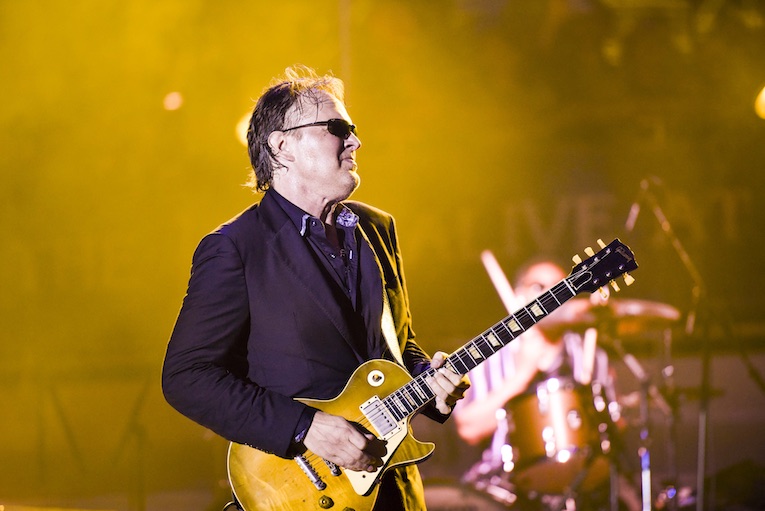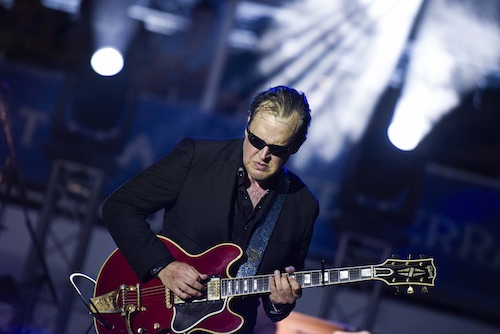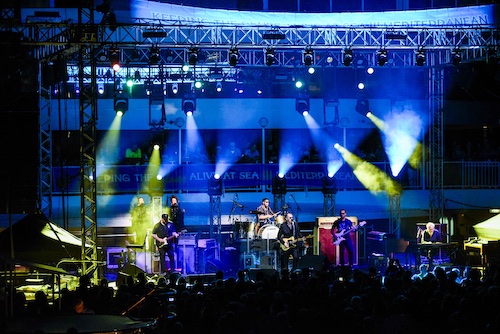
Photo: Simon Green
Interview with Joe Bonamassa
By Simon Green
With Joe Bonamassa it’s never a case of having to scratch your head thinking of what to talk about but, rather, given the multitude of different projects he has on the go or in planning at any one time, deciding what to focus on in the time allotted for an interview. On this occasion, as the musician had just played a concert at the Hollywood Bowl a few days previously, that seemed like a good place to start.
Rock & Blues Muse
How did it go at The Hollywood Bowl?
Joe Bonamassa
It was great; with the orchestra it was a little different. We used the L.A. Philharmonic.
Rock & Blues Muse
How did you approach the orchestral arrangements and the selection of songs to play?
Joe
We chose the songs and then had four people do the orchestrations: David Campbell, the legendary conductor, who also conducted the orchestra on the night, did some beautiful charts; Trevor Rabin, who you know from Yes, did some. He works a lot with producer Jerry Bruckheimer writing movie scores. Calvin Turner, our bass player, scored some, as did Jeff Bova, who’s done some work with us in the past; for instance, he did the arrangement for ‘Riviera Paradise’ on Reece’s records. He’s another bona fide legend. We had a real A team of orchestrators. The show presented some real challenges because we’re a loud, loud, band. It presented challenges sonically because if you’re miking up all these acoustic instruments you want to hear them.
Rock & Blues Muse
Were the arrangements tailored to the existing song structures or did they result in changes to them?
Joe
Kevin Shirley (Joe’s long-time producer) sent the versions of the songs that we wanted to do – he’s been working on this for nearly three and a half years. In a normal live gig I throw up my hand when I’ve done soloing and we move on. With an orchestra you’re pinned to those bars. The orchestra is as fearless as they are musically competent, but they’re pinned to the chart and can’t move. So, if I go off the bars – which I’m not counting! – the whole thing train wrecks. The orchestra has to keep going regardless of what their ears are telling them. They have a job, second violin plays this part, percussionist plays that part. If you start going off the charts then you are in freefall and are not going to be able to recover. We had to rehearse pretty intensely. We did a month-long tour in Europe doing festivals, had a blast, came back, took two days off, then rehearsed for five days, which is the last thing you want to do after four weeks on the road. Then we did four shows with Jeff Bova on keyboards emulating the sound of the orchestra where we practiced being pinned to bars; so much so that we had to rehearse being open ended again.
Rock & Blues Muse
Did that result in the band holding back at all?
Joe
We weren’t holding back but we were concentrating intensely – you have to listen to hit your marks. What I did was to take little cues from the orchestra. It wasn’t like you could just go out there, zone out and play an open-ended version of ‘Sloe Gin’; the orchestra will only play what’s on the page. The orchestra doesn’t make mistakes and if they do it’s because of what’s on the chart. You’ve just got to get your head around it. It’s my gig but you’re a guest of the orchestra. It’s like steering a cruise ship on the track of the Monaco Grand Prix; it steers like a cruise ship not a Ferrari. The seven-piece steers like a Ferrari; everybody listens so intently I can call audibles, do extra bars, it’s self-correcting. There’s a pitch and a yaw.
Rock & Blues Muse
Did you choose the songs with that restriction in mind?

Photo: Simon Green
Joe
Yes, we opened up for ourselves at the Hollywood Bowl, did seven songs in 45 minutes and got the rambunctious stuff out of our system. The orchestra really likes the mid-tempo numbers or the big ballads, which allows enough space to hear them. If you’re cramming high tempo stuff in there, why bother? There’s an epic quality to having a 50-piece band.
Rock & Blues Muse
Which songs did you play?
Joe
We did ‘Prisoner’ for the very first time. We brought out a song called ‘The Last Matador Of Bayonne’, which we played last night and which turned out to be a superstar; we did a version of ‘Ball Peen Hammer’. We did ‘Twenty-Four Hour Blues’ off the new album. Stuff that lent itself to the situation, like ‘Sloe Gin’. It was in part a retrospective. Some songs were orchestrated on the original recordings, we just hadn’t played them live like that. It was a really unique experience, playing a really cool venue with 10,000 people just over the hill from where I live, which made for a pretty special moment and wasn’t bad for a kid who showed up in L.A. twenty-five years ago.
Rock & Blues Muse
You must have nerves of steel. Were you the least bit daunted before going onstage?
Joe
My only thought was “don’t fuck it up!” We had ninety minutes, it’s a union rule; ninety minutes from the moment they come out and the time we take a bow. We used up eighty-nine minutes and thirty seconds! We couldn’t afford to screw anything up. The violins were in the cases at ninety minutes. There was a union representative there and it was a case of him saying “you’re done.” The Hollywood Bowl was the last venue to tick off on my bucket list of places to place because it’s so iconic.
Rock & Blues Muse
What prompted the decision to record Blues Deluxe volume two?
Joe
I wanted to do something for the twentieth anniversary of the album that kind of started my career. I’d done two albums that didn’t do anything before that came out and had been dropped from Sony. I’d got to work with Tom Dowd, which was awesome, but we were really nowhere at that point in 2003. We put all our money together, my manager and I, to record the album. If Blues Deluxe hadn’t got any traction and had flatlined or tanked, we wouldn’t be having this conversation. That was a backs against a brick wall moment, with no other options than to move forward. To be honest, I had to ask myself some questions, do I sing better than I did then, do I play better, am I a better musician now? The answer is in the songs because twenty years ago, when I was twenty-five, there was no way I could sing ‘Twenty-Four Hour Blues’, no way I could tackle some of these things. I can now, because I’ve been on the road for so many years and have become a better artist than I was when I was a kid.
Rock & Blues Muse
How did you select the songs for the album?
Joe
Josh (Smith, who produced) and I talked about it over two sessions, one at Sunset Sounds in L.A., and one at Nashville. A lot of the things we agreed about were obvious; he had the idea for ‘Twenty-Four Hour Blues’, I had the idea for ‘’ I Want To Shout About It’. ‘Lazy Poker Blues’ is a tribute to my British blues roots. My route to Mississippi was through London, like a lot of American musicians in the sixties and seventies. I wanted the album to be how I see my life in the fandom of the music; these are my tastes in the blues.
Rock & Blues Muse
You’re known for a tasteful selection of less well known, but great, songs for the various artists you’ve produced in recent years. Has that almost become a trademark?

Photo: Simon Green
Joe
Josh and I have this criteria, if we see deer trail tracks, we avoid them. If it’s too easy, what’s the point? As a producer the idea is to do something different. We consider whether the artist has the headspace to own the song. Marc Broussard, for instance, had very specific things that he wanted to do. He’s one of the great vocalists of his generation, so that was easy. With Joanna Connor it was a case of getting her a little out of her comfort zone. What I didn’t realise going in to work with her was that there was a punk rock voice within her, which hadn’t come out before. I said to her that she had to sing bigger than the band I’d assembled to play on the record. The reality of it is that it’s difficult, but she got her head around it. I was really proud of her. I tell artists, it’s not because I’m a task master but it’s because they’re the star and it’s star time! I tell them, when you listen to the final product and you start talking to the media, there’s going to be a couple of things that will come out, like “I haven’t heard you sing like that before”. That’s the moment when they realise that all that pain was worth it.
Rock & Blues Muse
Is there anyone that does the same thing for you?
Joe
Kevin Shirley…he tells me I’m shit!
For more information on Joe Bonamassa see his website here.
“Twenty-Four Hour Blues”

Great interview! Getting ready to listen through the entire Blues Deluxe Vol. 2 recording now :)